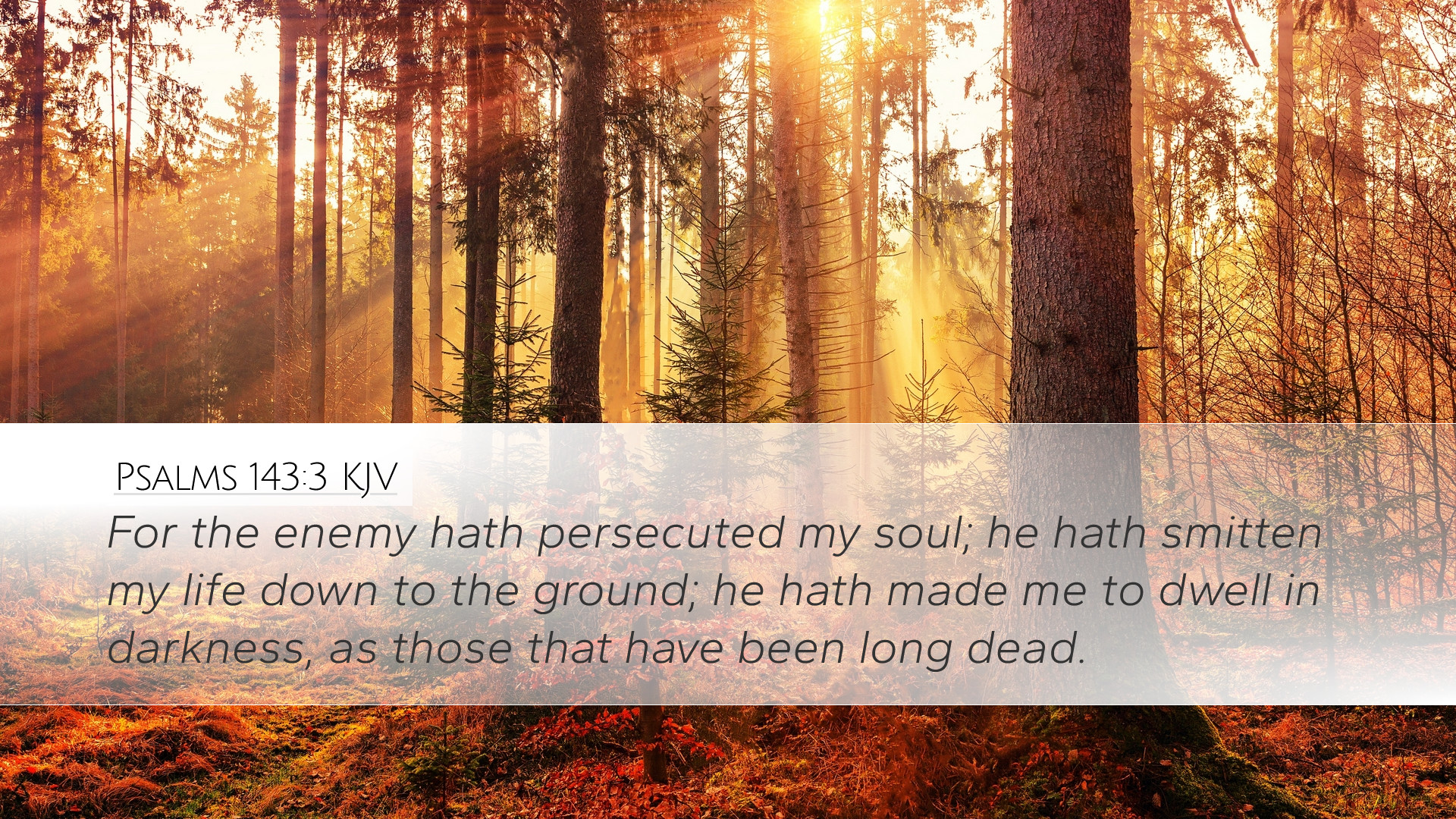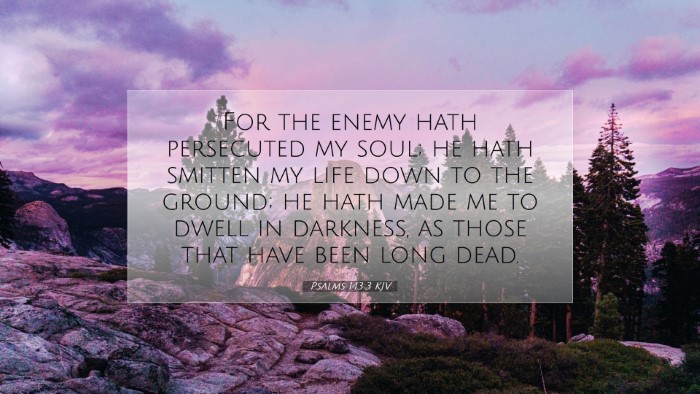Commentary on Psalms 143:3
Psalms 143:3 (KJV): "For the enemy hath persecuted my soul; he hath smitten my life down to the ground; he hath made me to dwell in darkness, as those that have been long dead."
Contextual Overview
This Psalm, attributed to David, reflects a period of deep distress and anguish, where the psalmist grapples with overwhelming enemies and seeks divine mercy. It is structured as a plea for deliverance, encapsulating the core themes of despair, the quest for hope, and reliance on God as the ultimate source of salvation.
Verse Analysis
1. The Nature of the Enemy
Matthew Henry notes that the “enemy” in this verse represents not just a physical adversary but could be understood as encompassing spiritual struggles and internal battles as well. He highlights that this term reflects the multifaceted nature of opposition faced by believers, emphasizing that David's persecution relates both to external foes and internal despair.
2. The Persecution of the Soul
Albert Barnes remarks on the intense personal suffering David experienced: “The enemy hath persecuted my soul.” This phrase indicates a profound spiritual and emotional assault that can resonate with anyone who has felt the weight of despair in their own life.
David's experience serves as a reminder for pastors and theologians to recognize that the battle against despair is as significant as the external conflicts believers might face.
3. Descent into Darkness
Adam Clarke elaborates on the imagery of darkness presented in the second half of the verse: “he hath made me to dwell in darkness, as those that have been long dead.” This metaphor signifies a state of hopelessness and spiritual desolation, akin to the conditions of the dead who lack sight and life. Clarke suggests that the imagery invokes the experience of being cut off from God's light and presence.
4. Theology of Suffering
The deep lament in this verse is not merely to express grief but it also lays a theological groundwork for understanding suffering as a part of the human experience. Matthew Henry points out that amid suffering, there is a unique opportunity for believers to experience God's grace. God's mercy is often revealed in times of distress, leading to a deeper relationship with Him.
Thematic Insights
1. God as Refuge
This verse is part of a larger plea for help, where David acknowledges both his plight and his need for divine intervention. It sets a precedent for believers to turn to God in times of darkness, seeking solace not in their circumstances but in the character of God as a refuge.
2. Solitude and Vulnerability
David's feeling of being trapped in darkness underscores the human condition of vulnerability. As Albert Barnes notes, the feeling of abandonment by God during difficult times is a common sentiment that can lead believers to greater reliance on prayer and supplication. This vulnerability may be an entry point for a profound spiritual awakening, as the believer acknowledges their dependence on God.
3. Spiritual Despair as a Catalyst for Prayer
This verse emphasizes prayer as a response to spiritual despair. As noted by Adam Clarke, David’s turn to God illustrates a primary venue for the release of distress. The act of pouring out his soul to God serves as a model for believers facing their own struggles—indicating that prayer is not a mere formality but a vital expression of trust in God’s providence.
Practical Applications
- Prayer Ministry: Pastors can encourage congregants to bring their deepest struggles to God, using David's heartfelt cry as an example of authentic prayer.
- Spiritual Counseling: The themes of darkness and despair may resonate with individuals experiencing depression or anxiety, providing a framework for understanding their journey.
- Promoting Dependence on God: The narrative encourages teaching about reliance on God, particularly when circumstances seem overwhelming. It underscores that in our weakness, God’s strength is made perfect.
Conclusion
Psalms 143:3 serves as a poignant reminder of the trials that leads believers to seek the face of God amid adversity. Through public domain commentaries, we can discern the richness within this text, revealing theological, spiritual, and practical truths for pastors, students, and scholars. The resonance of this Psalm in each believer's life underscores the timeless nature of scripture as it speaks to humanity's struggles against despair, while simultaneously inviting us to behold the steadfast love and grace of God as our utmost refuge.


